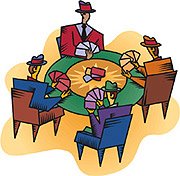Thursday, March 02, 2006
What the difference between a good player and a bad one?

The differences between a good and bad poker player are numerous. In the end, a bad player always has a chance to beat a good player, but the odds weigh heavier with the good player for these reasons:
1) They understand proper starting hands: Bad players play any two suited cards. Good players understand there is a 1 in 118 chance of flopping a flush, and a mere 11% chance to flop a draw to a flush. Good players value ranks or high cards, more than their suitedness.
2) They understand position: Being first to act with marginal cards is the worst way to be playing a hand. Trying to steal a pot by bluffing as the first person to act against several players doesn't give you much of a chance. Good players can gauge the strength of their hand by the checks and/or bets before them, and make more informed choices.
3) They understand pot odds: Say the pot has 500 chips in it. The flop gives you a flush draw. The player before you bets another 500 chips. Good players understand the odds of drawing to the flush are 3 to 1, thus this 500 chip bet is not giving them the right odds and they will fold this hand (and as a side note, understand they are playing against a strong player who understands how to freeze out draws).
4) They respect raises: Ace-Queen isn't a bad starting hand. But if they raise, are re-raised then a third player re-raises on top of everyone else, they understand Ace-Queen can't stand that kind of action. They know one of the other players is representing pocket Aces, Kings, or Queens, or Ace-King, and can get away from the hand.
5) They can fold: Bad players like to call down hands and see what their opponents are holding, even though they have a marginal hand like middle pair to call it down with. Good players can assess a players betting patterns, make good decisions as to the strength of their hand, and not be afraid to fold a hand they feel is beaten. As a side note, good players can exploit bad players' tendencies to call down hands and extract lots of chips.
6) They can get good value from their winning hands: Bad players tend to be too eager to get their chips in the pot with a strong hand and scare away their opponents with big bets. Good players can extract a maximum amount of chips through combinations of checks, calls, raises and check-raises.
7) They can determine their opponents' playing style and play accordingly: Good players will respect a bet or raise from a player who hasn't entered a pot in some time more so than a weak player. Good players will recognize loose players who play lots of pots, and give less credit to their hand and play what would normally be a marginal hand more aggresively.
8) They understand how to play with either a big stack or short stack, and how to play if the table is short or full: When you're a short stack, your choices are limited to all-in or folding. When you're a big stack, you can enter more pots and "bully" the other players and essentially gamble more. Weaker players tend not to change their playing methods as their chip stack changes. Likewise, when there are fewer players at the table, good players will give more value to lesser holdings then they would at a full table, while bad players don't understand the concept of "loosening" your starting requirements.
But, the allure of poker is that any player can still get dealt rockets or cowboys and beat you, no matter how you play. And sometimes you can start with the best hand, have the best odds, get the proper read and still get beaten by 2-7 offsuit. And there's nothing you can do about it. In the long run, good players will always win more often than bad players, and hopefully that will ring true when the "fish" sit down at your table!
Subscribe to Comments [Atom]

